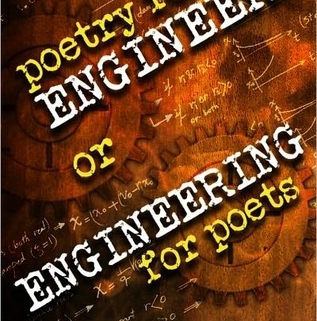Writing Poetry for Engineers – Behind the Scenes
Clayton Grow, currently a business intelligence manager at Time of Grace Ministry, earned his bachelor’s degree in Civil engineering and went on to get a master’s degree in Business Administration. In 2012, he published his collection of poems, titled “poetry for ENGINEERS *or* ENGINEERING for poets” to reach out to his fellow engineers and convey the importance and beauty of poetry in STEM…or vice versa. In an email interview with him, we learned more about what inspired him to write this book and his opinion on science and arts.
Hi Mr.Grow! Thank you for participating in our Science and Poetry theme. I spent some time browsing through your book and was really intrigued. What inspired you to write this book, especially on a typewriter? What was the sense of achievement like when you finished typing everything out on it?
I’ve always thought there is a deep connection between the scientific-oriented mind and the arts-focused mind. I’m naturally inclined to think about things scientifically, but I’ve found that I really enjoy when I give myself the opportunity to think creatively and use more of an adaptive mindset. Writing it on a typewriter was one way I thought I could make my poetry distinctive. I also knew it would affect my thought process when writing. It affected it even more dramatically than I thought it would.
I did feel a sense of accomplishment, but in re-reading some of my poems, there were spots in some of the poems I would have liked to tweak or improve and I was torn on whether or not to change the poems. If I changed the poems, it would kind of defeat the purpose of using the typewriter. So, I had to find a balance between perfectionism and consistency with the purpose of using a typewriter.
How do you think this book is going to attract engineers or why do you think an engineer will walk into a bookstore and pick out this book to read?
A few of my civil engineer co-workers said they really enjoyed some of the poems that described situations often seen by engineers working on construction sites. I’ve met many engineers that appreciate fine arts, though I’m sure it won’t appeal to every engineer. I’m hoping many will be intrigued simply because engineering and poetry seem to be polar opposite concepts. I hope both engineers and poets might be interested to see how these two fields of study can exist in the same book.
What has amalgamating engineering and poetry taught you as an engineer and as a poet?
As an engineer, it has taught to see engineered systems as works of art. Order, I believe, is beautiful because time always reduces it, and seeing something that is extremely ordered is evidence of forethought and effort.
As a poet, I’ve learned to see patterns to beautiful literature and artwork. I don’t want to imply that all art can be reduced to patterns and algorithms but seeing commonalities in good writing or good painting or photography is gratifying and helps me appreciate artists’ work ethic and methods.
Do you have another book in mind/Is another book on the way? If yes, would you continue with the same genre or switch things up a little bit?
I do have a book in mind, but it’s in very early stages. I am working on hiking the entire 1,100-mile long Ice Age Trail in Wisconsin. I only have about 700 miles hiked at this point but hiking it one 10-to-20-mile segment at a time has certainly taught me a lot about determination, logistics, and solitude. I’m still considering different formats, but a blend of fact and fiction might be interesting. Something akin to Hunter S Thompson’s Fear and Loathing in Las Vegas, only without the drugs and depravity.
What would be your message to someone who wants to write science poetry? Where would you say they should start?
There are infinite possibilities to talk about any of the engineering fields poetically or any of the arts fields scientifically. I think this combination is a hugely untapped market and could gain a wide audience. Start by noticing beauty in order. Appreciate what makes good architecture good.
Why do you think it is important to be able to balance creativity with science/engineering? Do you believe there must be a more cheerful, creative and colourful approach to technical subjects like engineering?
Being too focused on function and process can make you lose sight of why we design engineered systems: so that people can use them. I don’t know about cheerful, but I do think asking engineers to think more colourfully and creatively will lead to great things in science and engineering.
- The Art of Scientific Performance: Science Busking with David Price - March 4, 2020
- Denialism Attitudes and How to Approach Them – an interview with Christopher Swingle - September 12, 2019
- #BetterPoster: The New Minimalism Act - June 29, 2019
- Writing Poetry for Engineers – Behind the Scenes - May 23, 2019
- Conversations about Conservation: Simon Watt and The Ugly Animal Preservation Society - December 22, 2018
- India STEM Foundation – The First of Its Kind, connecting young minds around the world - October 25, 2018





Brilliant idea with tips. Poetry is feeling placed into the measure. The feeling should stop essentially, however the measure can be procured by art. I wish to read more like this.
Could you compose for me a civil engineer poem using engineering terms as follows;Algebra trigonometry solid mensuration
Physics thermodynamics differential calculus
Integral calculus higher mathematics soil mechanics
Surveying strength of materials
Thank you.
Excellent writing tips. Poetry is a plan of fulfillment and torture and wonder, with a scramble of the word reference. Please take some time to visit my article on A Guide to Writing Exceptional Poetry
I hope this will guide and help you too.
Thanks
Trinidad